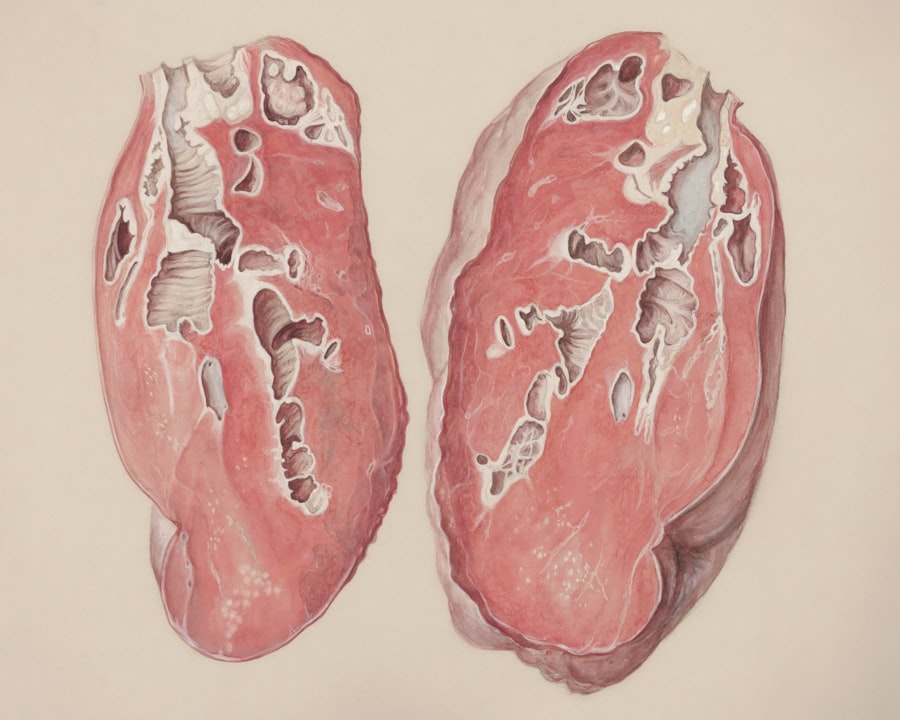When you think about your health, the liver might not be the first organ that comes to mind. However, this vital organ plays a crucial role in your overall well-being. The liver is responsible for filtering toxins from your blood, producing bile for digestion, and storing essential nutrients.
Unfortunately, various factors can lead to liver damage, including excessive alcohol consumption, viral infections, and poor dietary choices. Understanding how these factors affect your liver is essential for maintaining its health and function. Liver damage can occur gradually, often without noticeable symptoms until it reaches an advanced stage.
This insidious nature makes it crucial for you to be aware of the risk factors and early signs of liver distress. Conditions such as fatty liver disease, hepatitis, and cirrhosis can develop over time, leading to severe complications if left unaddressed. By educating yourself about liver health, you empower yourself to make informed decisions that can protect this vital organ and enhance your quality of life.
Key Takeaways
- Liver damage can result from various factors including excessive alcohol consumption, viral infections, and high sugar intake.
- Excessive sugar consumption can lead to non-alcoholic fatty liver disease (NAFLD) and other forms of liver damage.
- Symptoms of liver damage caused by sugar include fatigue, weight loss, jaundice, and abdominal pain.
- A diet focused on whole foods, low in added sugars and high in fruits, vegetables, and lean proteins, can help reverse liver damage.
- Foods to avoid for liver repair include sugary beverages, processed foods, and high-fructose corn syrup, while foods to include for liver repair are leafy greens, berries, and fatty fish.
The Role of Sugar in Liver Damage
Sugar is a common ingredient in many foods you consume daily, but its impact on your liver health may not be immediately apparent. When you consume sugar, particularly in the form of fructose found in many processed foods and sugary beverages, your liver is tasked with metabolizing it. Excessive sugar intake can lead to fat accumulation in the liver, resulting in non-alcoholic fatty liver disease (NAFLD).
This condition can progress to more severe liver damage if not addressed. The relationship between sugar and liver damage is complex. Your liver converts fructose into fat more efficiently than glucose, which can lead to an overload of fat in the liver cells.
Over time, this accumulation can cause inflammation and scarring, ultimately impairing liver function. By understanding how sugar affects your liver, you can take proactive steps to reduce your intake and protect your health.
Symptoms of Liver Damage Caused by Sugar

Recognizing the symptoms of liver damage is crucial for early intervention. While some signs may be subtle or easily overlooked, others can be more pronounced. You might experience fatigue, unexplained weight gain, or discomfort in the upper right abdomen as your liver struggles to function properly.
These symptoms can often be mistaken for other health issues, making it essential to pay attention to any changes in your body. As liver damage progresses, you may notice additional symptoms such as jaundice (yellowing of the skin and eyes), dark urine, or pale stools. These signs indicate that your liver is not processing waste effectively.
If you find yourself experiencing these symptoms, it’s vital to consult a healthcare professional for a thorough evaluation. Early detection can significantly improve your chances of reversing liver damage and restoring your health.
The Importance of Diet in Reversing Liver Damage
| Metrics | Results |
|---|---|
| Reduction in liver fat | 30% decrease |
| Improvement in liver enzymes | 50% decrease in ALT and AST levels |
| Weight loss | 5-10% decrease in body weight |
| Decrease in inflammation | 20-30% reduction in CRP levels |
Your diet plays a pivotal role in the health of your liver. By making conscious food choices, you can support your liver’s ability to heal and regenerate. A balanced diet rich in whole foods, including fruits, vegetables, lean proteins, and healthy fats, provides the nutrients necessary for optimal liver function.
Incorporating foods high in antioxidants can help combat oxidative stress and inflammation, further promoting liver health. Moreover, reducing your intake of processed foods and added sugars is essential for reversing liver damage. These foods often contain unhealthy fats and excessive sugar that can exacerbate liver issues.
By focusing on a nutrient-dense diet, you not only support your liver but also improve your overall health and well-being. Remember that every meal is an opportunity to nourish your body and promote healing.
Foods to Avoid for Liver Repair
To facilitate liver repair, it’s crucial to identify and eliminate foods that can hinder your progress. Sugary beverages, such as sodas and energy drinks, are among the top offenders due to their high fructose content. These drinks can lead to fat accumulation in the liver and should be avoided at all costs.
Additionally, processed snacks and fast food often contain unhealthy trans fats and additives that can further compromise liver health. Alcohol is another significant contributor to liver damage. Even moderate consumption can exacerbate existing issues or lead to new ones.
If you’re serious about repairing your liver, it’s best to eliminate alcohol entirely from your diet. By avoiding these harmful foods and beverages, you create an environment conducive to healing and regeneration within your liver.
Foods to Include for Liver Repair
In contrast to the foods you should avoid, there are numerous options that can support liver repair and overall health. Leafy greens like spinach and kale are excellent choices due to their high levels of antioxidants and vitamins that promote detoxification processes in the liver. Cruciferous vegetables such as broccoli and Brussels sprouts also play a vital role in enhancing liver function by aiding in the elimination of toxins.
Incorporating healthy fats into your diet is equally important for liver repair. Foods rich in omega-3 fatty acids, such as fatty fish (like salmon) and walnuts, can help reduce inflammation and improve lipid profiles in the liver. Additionally, fruits like berries and citrus are packed with vitamins and antioxidants that support liver health.
By focusing on these nutrient-dense foods, you create a powerful foundation for healing your liver.
Lifestyle Changes for Liver Repair
Beyond dietary adjustments, making lifestyle changes can significantly impact your liver health. One of the most effective changes you can make is to prioritize hydration. Drinking plenty of water helps flush toxins from your body and supports overall organ function.
Aim for at least eight glasses a day or more if you’re active or live in a hot climate. Another essential lifestyle change involves managing stress levels. Chronic stress can negatively affect your body’s ability to heal and function optimally.
Consider incorporating relaxation techniques such as meditation, yoga, or deep breathing exercises into your daily routine. These practices not only promote mental well-being but also support physical health by reducing inflammation and improving overall organ function.
Exercise and Liver Health
Regular physical activity is a cornerstone of maintaining a healthy lifestyle and plays a significant role in supporting liver health. Engaging in exercise helps regulate body weight, improve insulin sensitivity, and reduce fat accumulation in the liver. Aim for at least 150 minutes of moderate-intensity aerobic activity each week, along with strength training exercises on two or more days.
Incorporating movement into your daily routine doesn’t have to be daunting; even simple activities like walking or cycling can make a difference.
By prioritizing exercise, you not only enhance your liver health but also improve your overall physical fitness and mental well-being.
Supplements for Liver Repair
While a balanced diet should be your primary source of nutrients, certain supplements may provide additional support for liver repair. Milk thistle is one popular herbal supplement known for its potential protective effects on the liver due to its active compound silymarin. This herb has been shown to promote cell regeneration and reduce inflammation in the liver.
Another supplement worth considering is N-acetylcysteine (NAC), which acts as an antioxidant and supports detoxification processes in the body. Before starting any new supplement regimen, it’s essential to consult with a healthcare professional who can guide you based on your individual needs and circumstances.
Seeking Medical Advice for Liver Damage
If you suspect that you may be experiencing liver damage or have been diagnosed with a liver condition, seeking medical advice is crucial. A healthcare professional can conduct tests to assess the extent of any damage and recommend appropriate treatment options tailored to your situation. Early intervention is key to preventing further complications and promoting healing.
Regular check-ups with your healthcare provider will allow you to monitor your liver health over time. They may recommend blood tests or imaging studies to evaluate liver function and detect any abnormalities early on. By staying proactive about your health and seeking professional guidance when needed, you empower yourself to take control of your well-being.
Monitoring Progress and Maintaining Liver Health
Once you’ve made dietary changes and adopted a healthier lifestyle, monitoring your progress is essential for maintaining long-term liver health. Keep track of any symptoms you experience and note improvements over time. Regular follow-ups with your healthcare provider will help ensure that you’re on the right track toward recovery.
Additionally, consider keeping a food diary to help you stay accountable for your dietary choices. This practice allows you to identify patterns in your eating habits and make adjustments as needed. Remember that maintaining liver health is an ongoing journey that requires commitment and dedication; by staying informed and proactive about your choices, you set yourself up for success in achieving optimal well-being.
In conclusion, understanding the factors contributing to liver damage—especially sugar consumption—can empower you to make informed decisions about your health. By adopting a balanced diet rich in whole foods while avoiding harmful substances like alcohol and processed sugars, you create an environment conducive to healing your liver. Coupled with regular exercise, lifestyle changes, and professional guidance when necessary, you can take significant steps toward restoring your liver’s health and ensuring its longevity for years to come.
Recent studies have shown promising results in reversing liver damage caused by excessive sugar consumption.
For more detailed insights into how lifestyle changes can positively impact liver function, you can read a related article on this topic by visiting Explore Senior Health. This resource provides valuable information on maintaining liver health and offers practical tips for reducing sugar intake effectively.
WATCH THIS! 🧃The 60-Year Liver Lie: Why Your “Healthy” Juice Is Destroying Your Liver
FAQs
What is liver damage from sugar?
Liver damage from sugar refers to the harmful effects that excessive consumption of sugar can have on the liver. This can include conditions such as fatty liver disease, inflammation, and scarring of the liver.
What are the causes of liver damage from sugar?
Excessive consumption of sugar, particularly fructose, can lead to liver damage. This can occur through the consumption of sugary drinks, processed foods high in added sugars, and a diet high in refined carbohydrates.
What are the symptoms of liver damage from sugar?
Symptoms of liver damage from sugar can include fatigue, weight gain, abdominal pain, jaundice, and swelling of the abdomen. However, in the early stages, there may be no noticeable symptoms.
How can liver damage from sugar be reversed?
Reversing liver damage from sugar involves making lifestyle changes such as reducing sugar intake, maintaining a healthy weight, exercising regularly, and consuming a balanced diet. In some cases, medical treatment may be necessary.
Can liver damage from sugar be prevented?
Liver damage from sugar can be prevented by consuming a healthy diet low in added sugars, maintaining a healthy weight, exercising regularly, and avoiding excessive alcohol consumption. Regular medical check-ups can also help in early detection and prevention.
